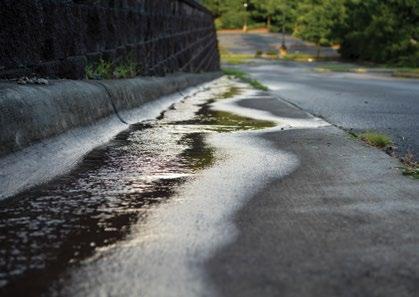
2 minute read
Stormwater Management: Why It’s Important
Managing the quantity and quality of stormwater is a crucial asset to the City’s sustainability efforts. Federal, state and local regulations require stormwater management programs to improve waterways by reducing the number of pollutants collected by stormwater as it travels through storm sewer systems. As required by the U.S. EPA, these management programs provide communities with clean and affordable drinking water, safe recreational opportunities and protect property from flooding. These programs aim to reduce the impact of stormwater runoff and surface water on our sewer systems.
Franklin Country Soil and Water Conservation District reports, common pollutants include oil and grease from roadways, pesticides from lawns, sediment from construction sites, bacteria from failing septic systems and carelessly discarded trash. When deposited into nearby waterways, these pollutants can impair the waterways, thereby discouraging recreational use of the resource, contaminating drinking water supplies and impairing the habitat of fish, other aquatic organisms and wildlife.
PREVENT STORMWATER POLLUTION STEPS YOU CAN TAKE TO HELP:
Here are some things that you can do to help:
• Pick up litter!
• Use environmentally friendly materials and follow application instructions carefully for fertilizers, herbicides and pesticides to maximize your outcome with the least impact.
• Never put anything into a stormwater drain other than stormwater. A single gallon of oil can pollute 100,000 gallons of water.
• Use car washes or environmentally friendly cleaners to limit soap from reaching our waterways.
• Do not disturb or mow the area near stream banks. This will help limit erosion and filter pollutants prior to entering the stream.
• Clean up after your pets. Fecal matter can be very damaging to ecosystems.
Reduce Runoff
What can you do to reduce the runoff from your property?
The United States Environmental Protection Agency has a few tips:
• Disconnect/redirect downspouts
• Use a rain barrel to capture rain from your roof
• Plant a rain garden
• Plant trees
• Reduce impervious surfaces; install permeable pavement
• Plant a green roof
“Stormwater quality must be protected because fresh water is a finite and critical resource. By keeping trash and contaminants from our waterways we are helping to provide clean and safe drinking water for ourselves and our downstream neighbors.”
— Kevin Weaver, Director of Public Service









